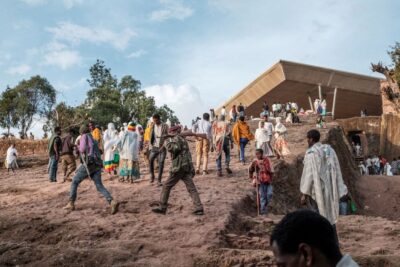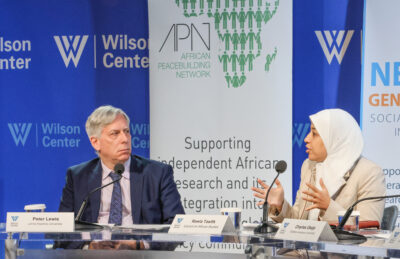At a time when Africa’s largest nation, Nigeria, is attempting a third transition to constitutional democracy, there has been a recent resurgence of studies of postcolonial governments and political processes. Two Council-sponsored panels at the November 1989 African Studies Association in Atlanta took as their focus the comparative analysis of the political systems and cultures of Caribbean and African nations.1The two panels and their participants were “Parliamentary Democracy in Africa and the Caribbean,” Peter Ekeh, University of Ibadan, chair, Carlene Edie, University of Massachusetts, Amherst; Clifford Griffin, University of Rochester; James Millette, University of the West Indies, Trinidad; Winsone A. Downie, Manhattan College, Parkway, discussant; and “Cultural Revival and Renaissance in Africa and its Diaspora,” Elizabeth Wilson , University of West Indies, Jamaica, chair; Tiffany Patterson, University of Toledo; Tejumola Olaniyan, Carter G. Woodson Institute, University of Virginia; Earl Lovelace, University of the West Indies, Trinidad; Manning Marable, University of Colorado; Acklyn Lynch, University of Maryland, Baltimore County, discussant.
Participants identified two competing explanations for the resilience of constitutional arrangements developed during the decolonization period in the British West Indies. A paper by Carlene Edie focused on professional and middle-class groupings, socialized through an unusually pervasive colonial educational system, and able to assume effective command of state structures. They have used these to develop sophisticated clientalist political machines. By these means they can distribute benefits to supporters on a sufficient scale to inspire relatively high levels of popular participation in elections. In these societies the state employs about a third of the labor force. This politics of patronage, though, remains dependent on continued access to international economic and financial resources.
“Notwithstanding African cultural survivals within the Caribbean diaspora, the trans-Atlantic slave trade, and the brutal regimentation of the plantations created a social environment in which British institutions had a much more transforming effect than in Africa.”The second approach, presented in a paper by Clifford Griffin, emphasized political culture rather than political economy. Regular elections, smooth changes of government, and preservation of individual freedoms are not adequately explained by the availability and distribution of economic resources. In structural terms, African and Caribbean countries are fairly comparable. In Africa, British colonial policies and the often hasty development of parliamentary electoral systems were imposed upon an existing matrix of indigenous cultures and social structures. By contrast, in the Caribbean, societies have evolved which are much more socially and culturally homogeneous. Notwithstanding African cultural survivals within the Caribbean diaspora, the trans-Atlantic slave trade, and the brutal regimentation of the plantations created a social environment in which British institutions had a much more transforming effect than in Africa. The continuity into the present of these institutions, in fact, stretches over centuries. The establishment of forms of representative government for white settlers on certain islands dates back to the seventeenth century. This has had ambiguous effects: historical traditions may have helped to enhance the popular legitimacy of electoral systems, but Caribbean scholars have also argued that “the authoritarianism inherent in the culture, social ideology, and social relations of the traditional plantation society has in some subtle ways . . . carried over into the contemporary value system.”2Carl Stone, “A Political Profile of the Caribbean,” in Caribbean Contours, ed. Sidney Mintz and Sally Price (Baltimore: John Hopkins University Press, 1986), 23. This is manifest, for example, in a common pattern of subservient deference to political leaders. It is also evident in the residual authoritarian character of inherited colonial constitutions.3James Millette, “Parliamentary Democracy in the Caribbean: How Democratic?” Paper presented at ASA, Atlanta, November 3, 1989.
Recent African studies also suggest that the cultural bases of political authority are key variables in the sustainability of democratic government. A recent Kenyan study contends that African democrats can draw no comfort from precolonial history because “the first general principle which seemed to lie at the base of nearly all African political systems was the concept of hierarchy . . . political organizations were conceived in a hierarchical structure with little or no horizontal checks and balances.”4V.G. Simiyu, “The Democratic Myth in African Traditional Societies,” in Democratic Theory and Practice in Africa, ed. Walter O. Oyugi, E. S. Atieno Odhiambo, and Michael Chege (Nairobi: Heinemann, 1988), 55. In modern Kenya, a fragmented economic base, an unreconstructed authoritarian colonial state, and a dominant tradition of rural property ownership, all combine to underpin a politically enervating “ideology of order.”5E. S. Atieno Odhiambo, “Democracy and the Ideology of Order in Kenya,” in Democratic Theory and Practice in Africa, ed. Oyugi et aI. Several African political scientists believe that popular political values and behavior can be related to the enduring influence of this precapitalist social structure.6Peter Ekch, “Colonialism and the Two Publics in Africa: A Theoretical Statement,” Comparative Studies in Society and History 17, no. 1 (1975): 91–112. From this viewpoint, politics is conducted within the frameworks of personal loyalty and benevolence which organize and bind together peasant communities.
“Olaniyan’s stricture concerning the Pan-Africanist discourse of African governments could as well be directed at the more pessimistic academic dissections of the cultural derivations of African politics.”Emphasis by political scientists on culture as a determinant of political behavior and structure is welcome in a scholarship in which beliefs and values have too frequently been characterized as epiphenomenal. Two contributions to the Council panel drew attention, though, to the dangers of making assumptions about popular cultural dispositions. The Trinidad novelist, Earl Lovelace, proposed that the suffering experienced in slave societies may have helped to develop a popular culture of resistance based on a sense of humanity engendered by slavery itself. His own novels, set in the idiom of Trinidad folk culture, suggest that externally-imposed values and institutions were widely contested. People do more than bear other people’s ideas, and historical “traditions” are constantly subject to rearrangement and reinterpretation. This point was also made with considerable force in Tejumola Olaniyan’s discussion of official depiction of “Africanity.” Olaniyan’s paper criticized rhetorical formulations of “an inner identity that survived the vagaries of colonialism.” Instead, he suggested, there existed “an identity that continually transformed itself in response to changing conditions and was thus able to understand, resist appropriately, and so survive colonialism.” Olaniyan’s stricture concerning the Pan-Africanist discourse of African governments could as well be directed at the more pessimistic academic dissections of the cultural derivations of African politics. They point to an important research agenda and suggest more positive political directions for the future.
Tom Lodge is professor of peace and conflict studies in the Department of Politics and Public Administration at Dean, Faculty of Arts, Humanities and Social Sciences at the University of Limerick. At the Social Science Research Council, he served as staff to the Joint Committee on African Studies (1987–1991) and the Joint Committee on the Near and Middle East (1988–1990).
This essay originally appeared in Items Vol. 4, No. 1 in March 1990. Visit our archives to view the original as it first appeared in the print editions of Items.













